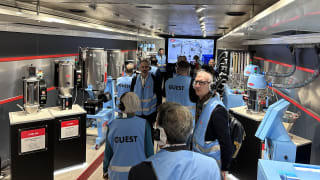 Ticona Introduces Family of Antimicrobial Acetals. Anti-Crobe Antimicrobial Polymers Includes Injection Molding and Extrusion Grades for Hot, Wet Environments.
Ticona Introduces Family of Antimicrobial Acetals. Anti-Crobe Antimicrobial Polymers Includes Injection Molding and Extrusion Grades for Hot, Wet Environments.The growing concern over bacterial contamination in many settings has led Ticona, the engineering polymers business of Celanese Corporation, to introduce Anti-Crobe Antimicrobial Polymers, a family of antimicrobial acetal copolymers (POM) that includes two injection molding grades and an extrusion grade. The line is targeted at applications calling for high-performance polymers in environments where heat, moisture and nutrients foster bacterial and fungal growth.
Evaluations of these grades, which are made with the company`s Hostaform and Celcon POMs, found they greatly inhibit microbial proliferation compared to conventional acetal. The tests considered bacterial growth at 35°C (99°F) over 24 hours. One of the injection molded grades, Anti-Crobe AM90S Plus, gave a log four reduction in bacterial activity within five hours. The other injection molding grade, Anti-Crobe AM90S, had a similar action within 24 hours. These results indicate that Anti-Crobe AM90S Plus is suitable for rapid bacterial control, while Anti-Crobe AM90S is appropriate in less-demanding situations.
- The advanced, inorganic antimicrobial formulation in these grades is present throughout the polymer matrix, not just on the surface, and does not migrate significantly - says Davida Barrett, Technical Marketing. - This means that Anti-Crobe resins won`t abrade or scratch off, so they preserve product performance and service life by deterring bacteria and fungal attack that can cause odors, contamination, stains, biofilms and mechanical property loss.
Anti-Crobe Antimicrobial Polymers comply with FDA regulations for direct food contact, meet the NSF 61 Potable Water standard, and satisfy applicable EPA regulations. They are naturally white and can be tinted as needed.
They retain all traditional physical and mechanical properties associated with Hostaform and Celcon POMs. For example, they have a tensile modulus of 2600 MPa, a flexural modulus of 2500 MPa, a tensile stress at yield of about 63 MPa, and a notched Charpy impact strength of 7 kJ/m2. They also have excellent resistance to chemicals and dimensional stability, are inherently lubricious, and withstand continuous exposure to hot water at 82°C (180°F) (and intermittent exposure to water at 100°C (212°F) or more).
Anti-Crobe POMs are suitable for many end uses, especially in hard-to-clean wet areas and where polyolefins cannot meet performance specifications. Their possible applications include food processing, storage and handling systems, industrial gears in wet environments, and elements in water treatment plants. Other potential uses include automotive heating and air conditioning systems, medical devices, appliances, spa and bathroom products, material handling systems, office products, sports equipment, and irrigation and other fluid-based systems.
Ticona, the engineering polymers business of Celanese Corporation, produces and markets a broad range of high performance products , and achieved net sales of 915 million dollars in 2006. Ticona employs approximately 2,000 individuals at production, compounding and research facilities in the USA, Germany and Brazil.


